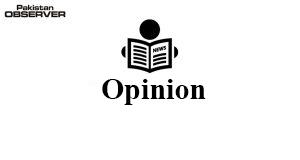Articles and letters may be edited for the purposes of clarity and space. They are published in good faith with a view to enlightening all the stakeholders. However, the contents of these writings may not necessarily match the views of the newspaper.
Politics on downpour
Currently politics is mainly focused on precipitation due to monsoon season and particularly Karachi metropolitan city is at the centre of discussion among politicians, media and general masses. However, other areas get less attention because of this rain fuss.
In rain emergency and urban flooding, public relief campaigns are essential to be conducted. As Sindh provincial ministers are busy in relief programs and making efforts to minimize people’s grievances and hardships that inflict during downpour in the metropolitan city. Despite this, other political opponents and biased media groups are excessively criticising Sindh government on this issue. As the monsoon season and raining in different parts of country is continuing, biased attitude of different groups within the country is increasing towards Sindh government on Karachi woes due to accumulation of water on streets.
However, it’s natural, downpour causes accumulated water on streets everywhere in the world including highly developed countries and government officials and relevant stakeholders are obliged to make efforts to decrease public sufferings. The condition of other major cities of different provinces is no different from Karachi. However, only Karachi is being targeted in the guise of ill affairs during rainfall. Why Lahore, Rawalpindi, Peshawar, Quetta and other cities are being ignored? And, criticism and debates should be initiated against those governments who rein these cities? Why only Sindh government and Karachi is on hot-spot?
ENGR ASHFAQUE KHOSO
Jamshoro, Sindh
New version old proverb
Over the years, we all have been hearing a proverb “he came, he saw and conquered”. Only the other day, I heard its new version “she came, picked up paintings and walked away”. I heard this new version during visit to the National Art Gallery where PNCA also has its headquarters after revival of art-related activities.
On my insistence, PNCA staff told me that immediately after the Independence Day celebrations, a not so familiar lady came to whom the PNCA Director General quietly handed over some art works of noted Pakistani artist Anwar Jalal Shemza which were on the Council’s Permanent Collection for the last 35 years. The lady picked up the art works and just walked away as she had come. The art works so given away were worth about Rs 10 million, they added.
Whether worthy Federal Education Minister Mr Shafqat Mehmood, who is also holding the additional charge of National History and Literary Heritage Division, was there? In response to this query, they said that neither the Minister Incharge nor electronic and media representatives were there. How come, please?
EIMAAD AHSAN
Rawalpindi
Rain and Karachi city
Through the courtesy of your newspaper, I wish to draw the attention of the concerned authorities towards the condition of Karachi city during rain. The ongoing heavy monsoon spell in Karachi has broken all records of downpour in the city during the month of August. Due to continuous rainfall, several areas of the city have been flooded, making it difficult to move around. Even public transport seems to be eradicated from the streets.
Not just this, residents of Karachi are facing severe electricity breakdowns, putting their work schedule at rest. Everyone was struggling of his own to save one’s belongings from rainwater. Many of the city’s underpasses are in poor condition. If it rains heavily in Karachi again, these underpasses will fill up and cause heavy loss to the citizens.
SYEDA FATIMA TAQI
Karachi
Nothing to celebrate
I try to understand what exactly the Zimbabwean President Emmerson Mnangagwa has so far achieved in office two years after inauguration. Corruption has increased in all sectors of the Zimbabwean economy including government institutions. He has also spearheaded the rigging of elections and has attempted to destroy the opposition party. Human rights abuses have intensified significantly worse than witnessed in Mugabe’s era.
Unemployment and high inflation have caused many Zimbabweans to cross Limpopo River with dangerous crocodiles into South Africa looking for better economic conditions. The Zimbabwean transport system is dysfunctional with poor roads network, traffic lights not working, roads full of potholes causing major accidents, road signs and directions are missing. The healthcare system has collapsed with hospitals with no resources, equipment and machines.
Nurses and doctors are always on industrial action seeking better working conditions. Operations are cancelled because of staff shortage and lack of electricity. Residents in urban areas are drinking sewage and mud-contaminated water. There have been numerous outbreaks of cholera, typhoid and diarrhoea. The banking system in Zimbabwe is unstable with no cash in banks, no cash in ATMs and no foreign currency. Period of President Mnangagwa’s two years in office has been served with abject failure and gross human rights abuses. He should resign.
TAPIWA MUSKWE
United Kingdom










